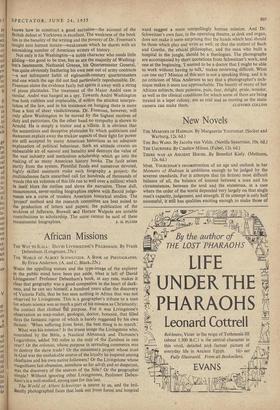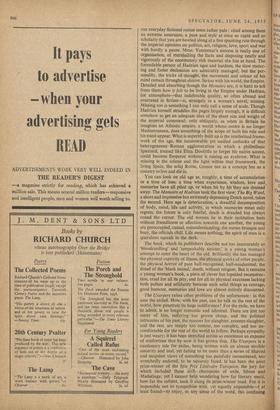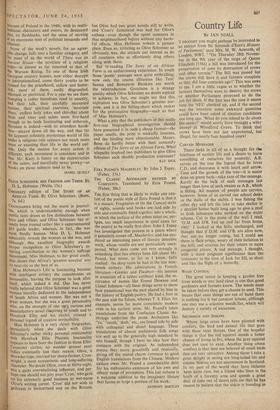New Novels
MME. YOURCENAR'S recoastruction of an age and outlook in her Memoirs of Hadrian is ambitious enough to be judged by the severest standards. For it attempts that (in fiction) most difficult balance of all, the balance of interest between a man and his circumstances, between the soul and the statesman, in a case where the order of the world depended very largely on that single man's capacity, judgement, and strength. If its attempt is only half successful, it still has qualities exciting enough to make those of our everyday fictional ration seem rather pale: chief among them an extreme assurance, a pace and style at once so rapid and so scholarly that you are bowled along at a fine spanking rate through the imperial opinions on politics, art, religion, love, sport and war with hardly a pause. Mme. Yourcenar's success is really one of organisation, of marshalling the facts and disposing neatly and vigorously of the enormously rich material she has at hand. The formidable person of Hadrian ages and hardens, the slow matur- ing and faster declension are admirably managed; but the per- sonality, the tricks of thought, the movement and colour of his mind remain throughout elusive. So too with his world, the Empire. Detailed and absorbing though the Memoirs are, it is hard to tell from them how it felt to be living in the Empire under Hadrian, for atmosphere—that indefinable quality, so often abused and overrated in fiction—is, strangely in a woman's novel, missing. Missing too is something I can only call a sense of scale. Though Hadrian himself straddles the pages largely enough, it is difficult somehow to get an adequate idea of the sheer size and weight of the imperial command; only obliquely, as when in Britain he imagines an Atlantic empire, a world whose centre is no longer Mediterranean, does something of the scope of both his rule and his mind appear. What is superbly built up is the intellectual frame- work of the age, the innumerable yet unified outlooks of that heterogeneous Roman agglomeration in which a philhellenic Spaniard, trained like Eliza Doolittle to forget his native accent, could become Emperor without it raising an eyebrow. What is missing is the colour and the light within that framework, the living Spain, the solid Rome, Greece not as a concept but as a country to live and die in.
You can look on old age as, roughly, a time of accumulation or a time of loss; a time when experience, wisdom, love and , memories have all piled up, or when bit by bit they are drained away. The Memoirs of Hadrian took the first view; The Big Ward, a short and impressive but extremely depressing Dutch novel, takes the second. Here age is deterioration, a dreadful decomposition of body, mind, life and activity, in which memories mean only regrets, the future is only fearful, death is dreaded but always round the corner. The old women lie in their institution beds without friendliness or affection towards one another, the young are preoccupied, casual, misunderstanding, the nurses brusque and busy, the officials chill. Life means nothing; the spirit of man is a querulous squeak in the dark.
The hook, which its publishers describe not too inaccurately as 'bloodcurdling' and 'unspeakably sinister,' is a young woman's attempt to enter the heart of the old. Brilliantly she has managed the physical captivity of illness, the physical quirks of other people, the physical horror of pain half-recognised, half-unadmitted, the dread of the 'black tunnel,' death, without religion. But it remains a young woman's book, a piece of clever but lopsided reconstruc- tion, cruel for all its pity, and for all its physical exactness lacking both pathos and solidarity because such solid things as courage, good humour, memories and love are almost entirely discounted.
The Usurpers raises other problems of the unfortunate : in this case the exiled. How, with his past, can he talk to the rest of the world, how penetrate its huge indifference? For the exile, we have to admit, is no longer romantic and admired. There are just too many of him, suffering has grown cheap, and the political intricacies of his past, the reasons for slaughter, counter-slaughter, and the rest, are simply too remote, too complex, and too un-
account of Poland in the 1940s, with its multi- tudinous characters and events, its desiccated Plot, its flashbacks, and the sense of moving in an enormous mist of political innuendo and allusion.
None of the week's novels, for an agree- able change, falls into a familiar category, and for most of us the world of There was an Ancient House—the novitiate of a religious order—is almost as far removed as that of the Warsaw Rising. To one of those Irish Georgian country houses, now either decrepit or in§titutionalised, come thirty youths to be trained for the priesthood, callow and home- sick, most of them, easily disgruntled, alarmed, or pietistical. For a year we see them trzunising a rather humdrum road to sanctity, and their talk, their carefully recounted routine, their spiritual exercises, 'novitiate blues,' endless holy jokes and chit-chat about birds and trees and saints seem first-hand enough to be both fascinating and unheroic.. Heroism is indeed—with its attendant harsh- ness—played down all the way, and that (to the layman) infinitely mysterious world of life under a religious rule appears not much more tense or exacting than life in the world out- side. Only the motive for every action is different, each movement is consistent and in line. Mr. Kiely is funny on the eccentricities of the saints; and mercifully never pawky—as books on pious subjects tend to be.
ISABEL QUIGLY



















































 Previous page
Previous page